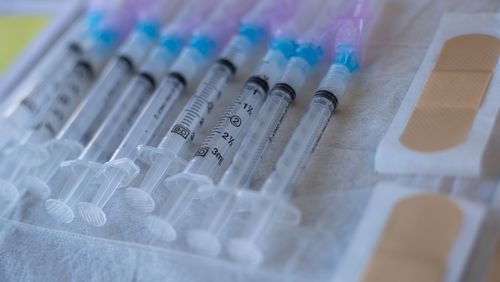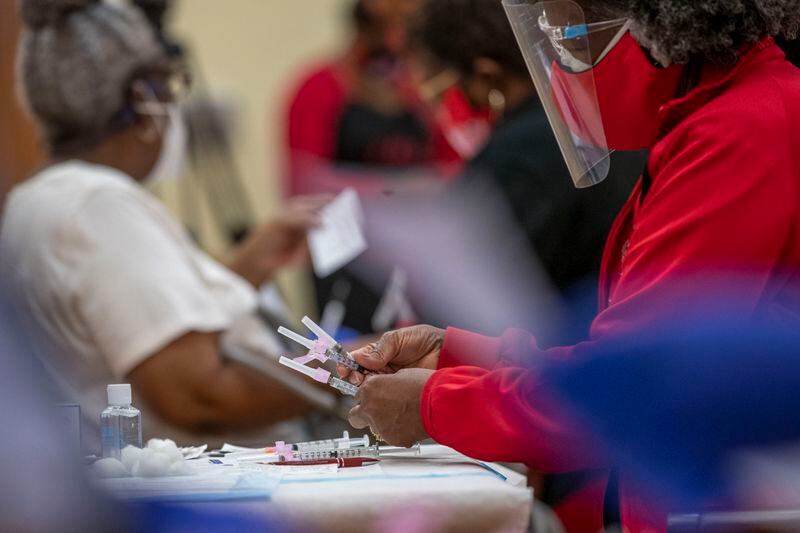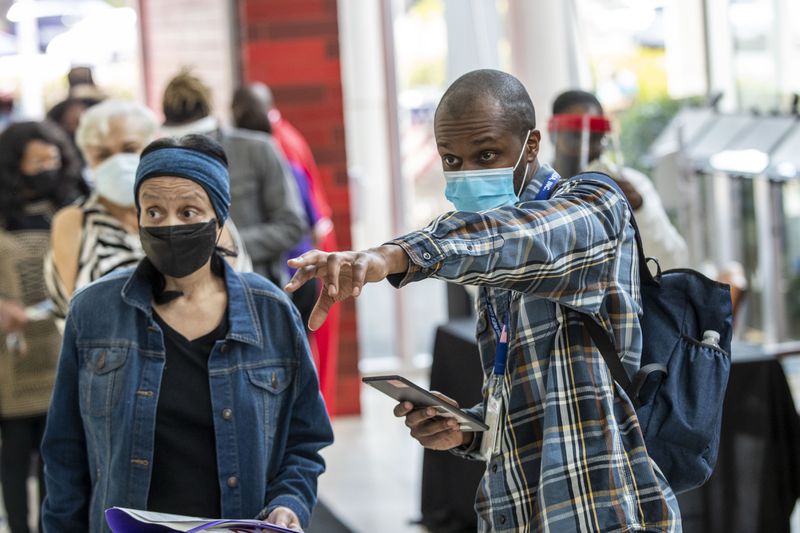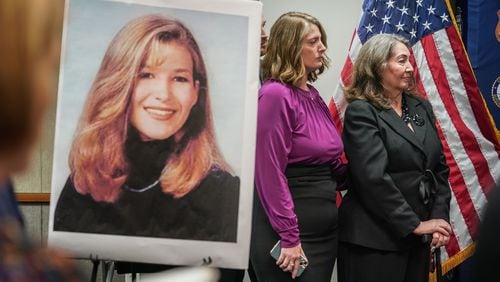State officials say they can’t expand eligibility because vaccine supplies are limited. What is being done to expand the vaccine supply?
The U.S. recently agreed to buy an additional 100 million doses from each of the manufacturers whose vaccines have been granted emergency use authorization: Pfizer/BioNTech and Moderna. The purchases mean each company will supply 300 million doses this year.
Pfizer has said that it will supply 120 million doses by the end of March and another 80 million by the end of May. The timeline for delivering the additional 100 million doses has not been announced, but the company recently said it hopes to cut production time in half, helping to speed distribution.
Credit: Alyssa Pointer / Alyssa.Pointer@ajc.com
Credit: Alyssa Pointer / Alyssa.Pointer@ajc.com
Moderna has said it will deliver 100 million doses by the end of March, and another 100 million doses by the end of May. Moderna has the goal of providing the additional 100 million doses by the end of July.
What other vaccines might be available soon?
Janssen Pharmaceutical Companies of Johnson & Johnson is seeking emergency use authorization from the Food and Drug Administration for its single-shot vaccine, and an FDA panel is scheduled to discuss the request Feb. 26. If the vaccine is approved, the company has said it expects to deliver 100 million doses by the end of June. However, a government report said J&J initially will be ready to deliver just 2 million doses at the time of emergency use authorization.
A fourth vaccine candidate could come from the Maryland-based company Novavax. The company is conducting a phase three clinical trial in the U.S., after completing a trial in the United Kingdom that showed the vaccine had an 89.3% efficacy rate.
What’s being done to get more vaccines to low-income communities?
The Federal Emergency Management Agency and CDC are working with state governments to identify vaccine center locations accessible to vulnerable and underserved populations, and the Biden Administration said it plans to open 100 federally assisted mass vaccination sites nationwide. Vaccines for these centers are supplied to states above and beyond their regular allocations. No sites have been announced yet in Georgia.
When more doses come, will it be easier to get a vaccine appointment?
There are other potential hitches. The U.S. and other countries are facing tight supplies of the specialty syringes used to extract all the doses of the Pfizer/BioNTech vaccine from vials. Without the specialty syringes, doses are wasted. The Biden Administration has said it will use the Defense Production Act to increase manufacturing of key medical supplies. But that may require factories to retool.
Another issue: personnel to run vaccination sites and administer shots. Gov. Brian Kemp in January eased requirements on who can give the vaccines. Medical assistants, LPNs and physician assistants can now administer vaccines without direct supervision of a physician. The order also allows those whose nursing licenses lapsed or became inactive in the past five years to obtain temporary permits to administer the shots.
Credit: HYOSUB SHIN / AJC
Credit: HYOSUB SHIN / AJC
With more doses being sent to pharmacies, chains like CVS and Walgreens are trying to hire pharmacists and other qualified people to fill syringes, administer shots and complete required documentation.
The federal government is also seeking to hire contract medical personnel to help administer vaccines.
Will any of the vaccines protect against the emerging variant viruses?
Some data suggests that the Pfizer, Moderna, J&J and Novavax vaccines may be effective against the B.1.1.7 variant first detected in the United Kingdom. But the vaccines appear to be much less effective against the strain B.1.351 first detected in South Africa. Despite the lower efficacy against that variant, some experts say that the vaccines will protect against hospitalizations and deaths.
Research is underway on vaccines that will protect against the emerging strains, and public health experts say it is likely people will need vaccine booster shots. The timing of potential booster shots has not been established.
What does it mean for a vaccine to have a 95% efficacy rate?
It means that vaccinated people have a 95% lower rate of developing COVID symptoms compared with those who haven’t been vaccinated. The vaccines authorized in the U.S. so far have also been 100% effective in clinical trials at preventing severe disease. While the vaccines are highly effective at protection from symptoms, it is not yet determined if they protect from becoming infected with COVID-19. That leaves open the possibility that people could still be contagious after being vaccinated and put others at risk.
My appointment for a second dose has been delayed. Is it safe to wait on the second doses of the Moderna or Pfizer vaccines?
The latest guidance from the CDC says that people can wait up to 42 days between doses. However, developers of the Moderna and Pfizer/BioNTech vaccines say that there is limited data about the efficacy of the vaccines beyond their recommended interval, which is 28 days for the Moderna vaccine and 21 days for the Pfizer/BioNTech.
Who is eligible now to get the vaccine in Georgia?
Health care workers; residents and staff at long-term care facilities; people 65 and older, police officers, fire personnel and other first responders are eligible.
Under the next phase, called 1B, essential workers who perform jobs across critical infrastructure will be eligible. Those include teachers and workers whose tasks are critical to public health, safety, economic and national security. After that, in phase 1C will be people ages 16-64 with medical conditions that increase their risk for severe COVID-19.
Can children be vaccinated?
The Pfizer/BioNTech vaccine has been authorized for those 16 and older, and the Moderna for those 18 and older. Pfizer has enrolled children ages 12 to 15 in a clinical trial and plans to enroll children 5 to 11 later this year. Moderna also has begun a clinical trial with children 12-17 and expects to begin a trial with children as young as 6 months up to 12 years old by sometime in March. Dr. Anthony Fauci, director of the National Institute of Allergy and Infectious Diseases, has said that a vaccine may be authorized by September for school-age children.
Credit: Alyssa Pointer / Alyssa.Pointer@ajc.com
Credit: Alyssa Pointer / Alyssa.Pointer@ajc.com
What is the status of vaccinations at Georgia senior care facilities?
CVS and Walgreens, which have federal contracts to administer vaccines in most facilities, have completed the first round of vaccination clinics at Georgia nursing homes and a second round at most. The two companies have administered first doses at a majority of Georgia assisted living communities and large personal care homes, according to data from the companies.
If I am 65 or older, how do I get the vaccine?
The Georgia Department of Public Health in January launched a vaccinator locator website to help people find out locations that had vaccine supplies. But many vaccine providers lacked the software to schedule appointments and personnel to run vaccination clinics, and appointments were often booked within hours of being posted.
DPH has said it hopes to launch a centralized appointment scheduling system by the end of February, along with a central phone number for making vaccine appointments.
Does the vaccine have side effects?
Yes, some people will experience side effects, more commonly after the second dose. Those are most often reported to be fever, chills, tiredness and headache that last one or two days. But experts stress that experiencing a side effect isn’t a sign that something’s gone wrong. The side effects are evidence of the body mounting a strong immune response to the vaccine. Ultimately, a vaccine prepares a person to fight off an infection by training the immune system.
Only a very small number of people have had something more serious, called an adverse reaction. From Dec. 14, 2020 through Jan. 18, 2021, CDC identified 66 cases of anaphylaxis, where people suddenly have difficulty breathing, from its Vaccine Adverse Event Reporting System. Overall, about two to five people may experience anaphylaxis for every one million people vaccinated.
The reaction almost always occurs within 30 minutes of vaccination, and all the cases have been caught within the time a person was being monitored after the shot, and all recovered.
What do the shots cost?
The vaccine itself is provided at no charge because it was purchased by the federal government and sent to providers for free. Providers can charge up to $21.93 for administering the shot but patients may be reimbursed by insurance, and the fee must be waived if the person can’t afford it.
Once I know someone is vaccinated, can I take off my mask around them?
No, and they shouldn’t, either. For two reasons. First, each vaccine shot takes up to two weeks to become effective. No one will be immediately immune. Second, the vaccines aren’t perfect. Their real power lies in speeding us to herd immunity, a situation where so many people are immune that one infected person can walk into a group without being able to start a chain of infections.
Public health officials announcing the vaccinations have urged everyone — both those vaccinated and those who aren’t yet — to keep all their safety measures in place, including physical distancing, wearing masks, and washing hands.
About the Author










